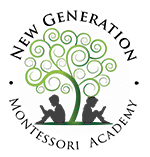The Challenge
The Century Of the Child
The century in which we live has sometimes been called “The Century of the Child”; and certain it is there has never been another epoch in which there have arisen so many movements centered in the child and its welfare. No one has better represented this movement than the great Italian educationalist – Dr. Maria Montessori.
The soul of the child
Many others have loved children, worked for them, and with them; but no one has so completely understood the soul of the child in its depth and greatness, in its immense potentialities, and in the mysterious laws of its development.
What Wordsworth said of the child – ‘Oh thou whose exterior semblance does belie thy soul’s immensity’ – was the foundation of her work. It was the child himself, his soul, his person, which she cared about, not just ‘Education’ in the narrow sense of the word. Because children are living, immortal souls they are entitled to as much reverence and respect – as persons – as adults. In fact, Montessori’s whole life’s work might be summed up as a defense of him whom she used to call Il cittadino dimenticato (‘The Forgotten Citizen’) and for the establishment of his rights.
Alone among the long line of great European educators – Rousseau, Pestalozzi, Froebel, Herbart, etc. – she maintained that the one really essential preparation for a would-be teacher is a moral and spiritual one. No one, she said, is fit to direct the child’s development who has not striven to purge herself of those two sins, to which teachers are most prone, – Pride and Anger.
Most people think of Dr. Montessori as the founder of the educational method which bears her name, but her real significance lies deeper. She will go down in history as one who discovered and revealed to the world qualities in childhood different from and higher than those usually attributed to children. By giving freedom (in a biological sense) to children in a specially prepared environment, rich in motives of activities, she was able to show to an astonished world children of 41/2-51/2 years who learned to read and write spontaneously; who chose to work rather than play or eat sweets; who loved order and silence; who displayed long-sustained and quite spontaneous intellectual concentration; who developed a real social life in which mutual helpfulness took the place of competition; who, though able to carry on their life with astonishing independence of adult help, were nevertheless extraordinarily docile and obedient, and finally children in whom liberty, far from producing chaos, resulted in a hitherto unknown collective discipline.
Dr. Montessori was par excellence the great interpreter of the child: and though she herself has passed on from the scene of her labors her work will still go on. Indeed, it will last as long as children are born into this world to grow up in it with loving hearts, eager searching minds, and eyes wide open with wonder.

The soul of the child
In the words of her son: (from Education for Human Development, Mario Montessori)
“All children are born geniuses. 9999 out of every 10,000 are swiftly, inadvertently, ‘de-geniused’ by grown-ups.”
This happens because humans are born naked, helpless, and — though superbly equipped cerebrally — utterly lacking in experience, therefore utterly ignorant. Their delicate sensing equipment is, as yet, untried. Born with built-in hunger, thirst, curiosity, the procreative urge, they can only learn what humanity has learned by trial and error — by billions upon billions of errors. Yet humanity is also endowed with self-deceiving pride. All those witnessing the errors of others proclaim that they (the witnesses) could have prevented the errors had they only been consulted. “People should not make mistakes” they mistakenly say. Motivated entirely by love, but also by fear for the futures of the children they love, parents act as though they know all the answers and curtail the spontaneous exploratory acts of their children, lest the children make “mistakes’. But genius does its own thinking; it has confidence in its own exploratory findings, in its own intuitions, in the knowledge gained from its own mistakes. Nature has her own gestation rates for evolutionary development. The actions of parents represent the checks and balances of nature’s gestation control. Humanity can evolve healthily only at a given rate. Maria Montessori was fortunately permitted to maintain, sustain, and cultivate her innate genius. Her genius invoked her awareness of the genius inherent in all children. Her intuition and initiative inspired her to discover ways of safeguarding this genius while allaying fears of parents. But the way was not always easy. Hers was the difficult frontiering task of genius.
